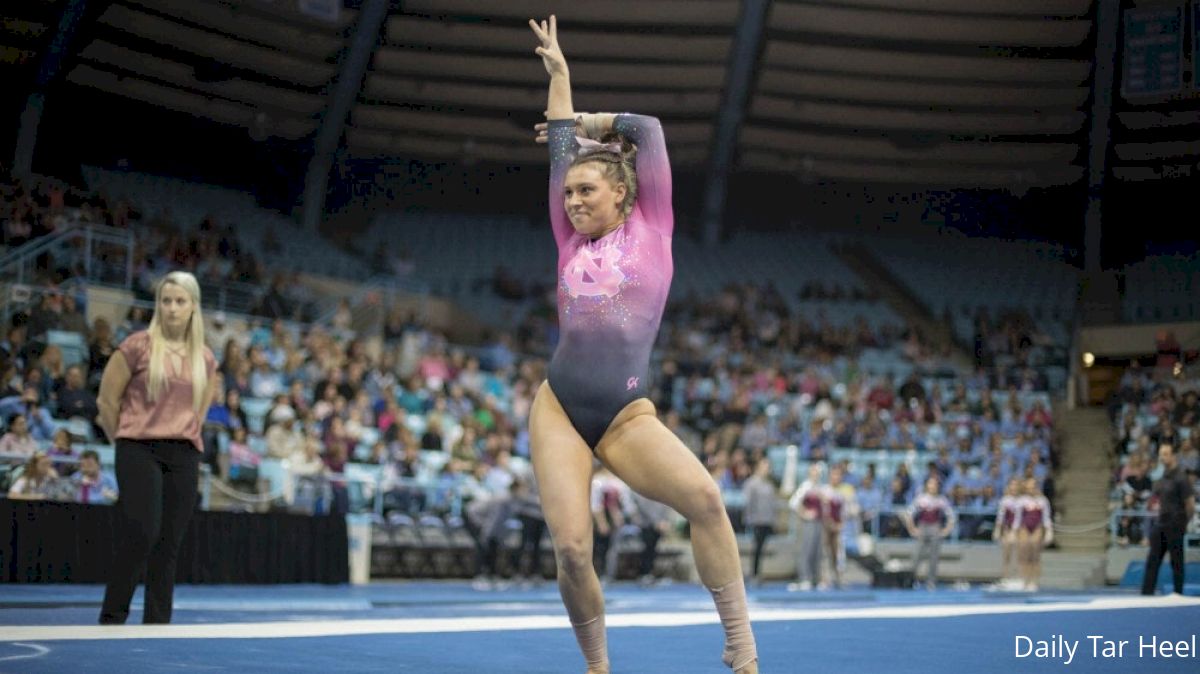UNC Grad Student Megan Ruzicka Has Walked An Unconventional Path
UNC Grad Student Megan Ruzicka Has Walked An Unconventional Path
Megan Ruzicka left the sports after her sophomore year at Iowa, but returned as a grad student at North Carolina.

It is no secret that gymnastics is a hard sport to stay in. It’s extremely wearing on the body, tough mentally—honestly it can just be downright scary. Many gymnasts’ careers are marred by injuries, and the higher you progress in the sport, the more of your teammates start dropping out for one reason or another. Only a lucky few ever make it to the elite or college levels.
The path for a gymnast’s career, barring injuries, is pretty standard. You start in club and either get recruited for college or go elite. If you stick with it, there are a few variances to the formula. Some gymnasts compete at the elite level for a few years then enter the world of collegiate gymnastics (as long as they did not accept any sponsorships during their time in elite). Some collegiate gymnasts redshirt for a year and then compete for their school for a fifth year while in a grad program. But those are pretty much the most common paths.
However, it turns out there are other options. I got the opportunity to chat with a former teammate of mine, Megan Ruzicka, whose career took a fascinating and impressive turn after her sophomore year of college. Ruzicka is currently competing for the University of North Carolina while working on a masters degree in statistics, putting back on her leotard after a brief interlude in her gymnastics career during which she had no plans to ever return to the sport. Now she’s back and better than ever, and I was eager to catch up with her and see how she got to where she is now.
Ruzicka started her gymnastics career in club gymnastics at the IGI, then was recruited to the University of Iowa. After her sophomore year, she decided to leave the sport and transfer to Northwestern and focus on her academic endeavors. As far as she knew, this was the end of her time in the gymnastics.
“When I went to Northwestern, I just kind of assumed I would be done,” she said. “I tried other things like diving and rowing to fill the void, but nothing compared to the way that gymnastics made me feel.”
So she joined the club gymnastics team at Northwestern. But the lax environment of club gymnastics made her miss the competitive edge and the hard training of Division I athletics.
“Eventually I just made the decision that I wanted to take it more seriously, I want to do college gymnastics again,” she said. To do this, she would have to go somewhere else to start seriously training, and that’s how she ended up back at IGI.
Turns out, you can go back to competing in J.O. gymnastics after being on a collegiate team. And Ruzicka did just that. She started training at her old club in September of her senior year of college and worked to get her old routines back.
Bars was the first event she attempted, not only because it’s easier on the body, but because, as Ruzicka said, “It always feels like you’re flying, it’s the best.” Can’t argue with that.
Before she started the recruiting process in October, Ruzicka wanted to make sure she was back to her old form on the other events, namely vault and floor. “I had done bars and beam just because I knew those events would be lighter on my body, so I wanted to make sure I had the other skills back when I started recruiting,” she explained.
When getting recruited, it’s important to have the most visibility to colleges as possible, and to do that you have to prove yourself in competition. Ruzicka competed in about three club meets to get that done.
Although that may sound awkward, competing in club tournaments past the age of 20, going through the recruiting process at that age has a sneaky benefit.
One of the well-known rules is that until your junior year of high school, you are not allowed to speak with the coaches. They can contact you, but you cannot reach out to them. At 21 years old and in her senior year of college, that rule did not apply to Ruzicka. She was able to chat with coaches and get a better feel of their coaching style.
“Having been through the process before, you kinda gauge a bit better [what would be a good fit],” she said. “This is extremely valuable for someone looking to spend 25-plus hours a week with them.”
She also knew exactly what program she was looking for academically. “Originally I knew I wanted to get a master’s degree in statistics, so I started by looking at schools that offered a masters degree along with management science or operations research, and UNC had a top program and there were a couple of other schools with really programs.”
The deciding factor was meeting UNC’s head coach, Derek Galvin. Her recruit trip coincided with UNC’s homecoming weekend, and she saw the great relationships he had with former team members.
“You could tell he cared about them more than them just being athletes,” Ruzicka said.
After that trip it was decided; she had found her school and her team. Ruzicka is now happily competing AA for UNC, back in the sport that she loves but never thought she would have the chance to do again. For her, competing again “is amazing.”
“I never thought I would be back. I’m happy to be there and have teammates and that community—to be able to contribute to the team is the greatest feeling.”